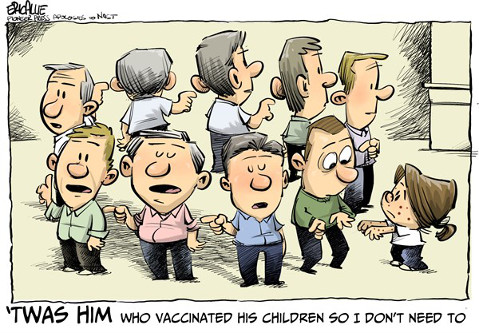Fear the Disease, Not the Vaccine
Risks from Sickness Far Larger Than Vaccine Risk

One simple action could save your child’s life. It could save your friend’s child. Your neighbor. Or someone across town, someone you’ve never met but might sit next to one day at a concert.
Our work revolves around protecting and caring for our community. With this in mind, we urge you to make sure you and your family have current vaccinations.
As the number of immunized children and adults decreases, we’re now seeing more cases of certain highly infectious diseases that hadn’t appeared in the U.S. in decades. It’s a dangerous trend. At the same time that we’re fighting to cure new diseases, we’re re-fighting battles against ones that our parents’ generation had all but eradicated for us. Their good work is being undone.
Vaccines are a life-saving invention that can protect us from once-rampant diseases like measles, mumps, rubella, chickenpox, and whooping cough. These diseases have caused thousands of deaths and can have complications that include blindness, paralysis, infertility, and brain injury.
It takes a 95 percent vaccination rate to protect a community. Many of Santa Barbara’s elementary schools are reporting vaccination rates of less than 80 percent, with some hitting an alarming low of 50 percent. With that many unvaccinated children, it is no surprise that we’re seeing outbreaks of disease.
You could make the difference for those who are most fragile, those who are at greatest risk if we don’t get vaccinated. Today most deaths from whooping cough occur in infants less than three months old. These infants aren’t yet old enough to be vaccinated, so their safety relies on others getting vaccinated. Every family member and caregiver in contact with an infant must be vaccinated in order to cocoon the baby from potential exposure to whooping cough.
You could make the difference for those with weakened immune systems, and for patients on chemotherapy who can’t receive certain vaccines. Their health, too, depends upon the rest of us getting our immunizations. We can protect them by getting current vaccines, including vaccines for flu and pneumonia. A high rate of immunization is our best defense against these illnesses that can lead to serious complications for people of any age.
Imagine having to tell a person that their loved one died of an entirely preventable disease. As physicians, we are sometimes placed in that heartbreaking situation because our community, or even the person’s own family, did not have the vaccinations to provide protection.
If you are a parent of a young child, chances are you were vaccinated. We urge you to give your child that same protection. It’s an important decision, and there’s a lot of misinformation circulating. If you or your child hasn’t been vaccinated, see your doctor, get your questions answered, and get the facts you need about risks and benefits of vaccines.
People sometimes tell us they worry about an autism link. The report that created this fear was falsified, and the British medical journal that published the report in 1998 retracted it two years later. In all the years since then, the rigorous research has been very clear: There is no link between autism and vaccination.
Today’s vaccines are closely monitored; they are safe and highly effective. Millions of Americans receive the recommended vaccines every year, and serious side effects are extremely rare.
Some people say they don’t want to take the risk. The truth is, the very real risks from disease far outweigh any remote risks of adverse reaction from vaccines. Two in a thousand people who get measles will die from the disease. One in a million will have a severe allergic reaction from the vaccine.
Santa Barbara is a vibrant community filled with parents who want to make healthy choices for their families. We see this every day. And as doctors and parents, we follow the same advice we give to our patients: We get vaccinated, and our families do, too.
As a community, by getting vaccinated and vaccinating our children, we can protect the next generation, today’s infants, and the most vulnerable. And for that reward, the risk and effort that falls on us is stunningly small. Let’s do this together.
Dr. Steven C. Barkley is the NICU (Neonatal Intensive Care Unit) medical director and chief pediatric medical officer for Cottage Children’s Hospital. Dr. David Fisk is Infection Prevention and Control medical director and co-medical director of Antibiotic Stewardship for Cottage Health System, and also an infectious diseases physician with Sansum Clinic.



